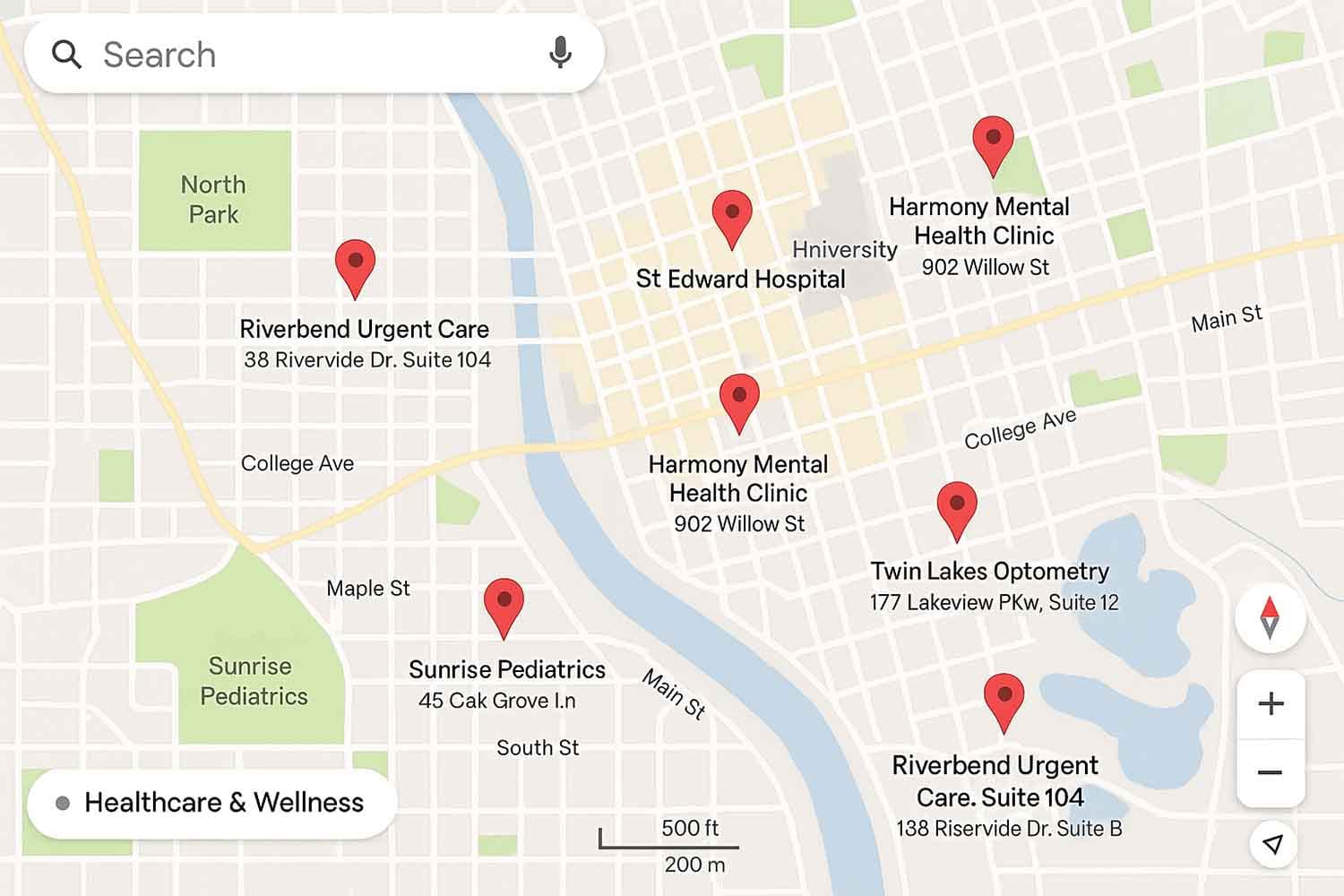Location Page Schema Markup: The Complete Guide to Local Business Structured Data
Your competitors are stealing customers while you sleep—not through better service, but through better search visibility. Every day your location pages lack proper schema markup, you’re handing qualified leads to competitors who show up with star ratings, business hours, and phone numbers right in the search results.
Location page schema markup transforms your invisible business details into explicit signals that search engines can’t ignore. While your competitors rely on hope and outdated SEO tactics, you’ll own the map pack with structured data that makes Google’s job easier—and your phone ring more often.
Key Takeaways
- Location page schema markup helps search engines understand your business information for better local search visibility
- JSON-LD format is Google’s preferred method for implementing LocalBusiness structured data
- Proper schema markup can generate rich results showing business hours, reviews, and contact information in search results
- Multi-location businesses need different approaches for homepage vs individual location pages
- Schema markup is not a direct ranking factor but improves click-through rates and user engagement
- Regular validation using Google’s Rich Results Test tool ensures error-free implementation
What is Location Page Schema Markup?
Location page schema markup is structured data markup specifically designed for local business web pages that provides search engines with explicit, standardized information about your physical location and business attributes. Think of it as a translation layer between your website content and search engine understanding—instead of guessing what your business does and where it’s located, search engines get precise, machine-readable data.


This markup leverages the Schema.org vocabulary, an open community HTML specification founded by Google, Microsoft, Yahoo, and Yandex to standardize how websites communicate with search engines. Rather than leaving search engines to interpret your contact page or about section, schema markup delivers your business details in a standardized format they can process instantly.
The primary schema type for most local businesses is LocalBusiness, with specialized subtypes available for restaurants, dentists, auto dealers, and dozens of other business categories. Implementation happens through JavaScript notation embedded in your page’s HTML—most commonly using JSON-LD format that Google prefers for its simplicity and separation from visible content.
Location-specific schema differs from general organizational markup in crucial ways. While Organization schema works for corporate homepages providing global brand information, LocalBusiness schema targets individual business locations with specific addresses, phone numbers, and operating hours. For businesses with multiple locations, each location page requires its own distinct properties and structured data markup.
Why Location Pages Need Structured Data
Search engines work hard to understand web pages, but they’re essentially reading millions of pages written in human language without explicit context clues. When you add structured data to your location pages, you’re providing search engines with a direct pipeline to your most important business information—no interpretation required.
Enhanced search engine understanding translates directly into improved visibility in local search results and Google Maps listings. Your business hours, address, phone number, and services become searchable elements rather than just text on a page. This visibility advantage compounds in competitive local markets where dozens of similar businesses fight for the same keywords.
The real payoff comes through rich results that display your business information directly in search results before users even click through to your website. Star ratings, business hours, contact information, and even photos can appear in these enhanced search results, dramatically improving click through rates compared to plain text listings.
Voice search optimization represents another critical advantage as digital assistants increasingly rely on structured data for accurate business information. When someone asks their phone for “dentist near me open now,” the assistant pulls from structured data to provide precise answers rather than forcing users to visit multiple websites.
Multi-location brands see the most dramatic competitive advantages from location page schema markup. While single-location competitors might get away with basic SEO, businesses with multiple services across different locations need the scalability and consistency that only structured data provides.
Types of Location Schema Markup
LocalBusiness schema serves as the foundation for most location pages, providing essential properties like business name, address, phone number, and operating hours. This general schema type works for service businesses, retail stores, restaurants, and professional services that operate from a specific business location.
Industry-specific schema types offer enhanced functionality for specialized businesses. Restaurant schema includes properties for cuisine type, menu information, and reservation systems. Medical organizations can use schema types like Dentist, Physician, or Hospital that support appointment booking and accepted insurance details. Auto-related businesses benefit from AutoDealer and AutoRepair schemas with inventory and service-specific properties.


Service area businesses present unique challenges since they serve customers across geographic regions without requiring visits to a physical location. Service area schema allows businesses like plumbers, electricians, and consultants to specify their coverage areas while maintaining location-based credibility.
The department property becomes crucial for businesses with multiple locations or distinct service divisions. Rather than creating separate business entities, the department property allows you to organize related locations under a single organizational umbrella while maintaining individual location specificity.
Organization schema complements location-specific markup by handling corporate-level information on company homepages. This creates a hierarchical structure where the main business entity connects to individual locations through consistent branding and contact information.
Essential Schema Properties for Location Pages
Required properties form the backbone of any local business schema implementation. The name property should match exactly what appears on your Google Business Profile and throughout your website. Address information requires a complete PostalAddress object with street address, city, region, postal code, and country specified separately for maximum search engine clarity.
Telephone numbers need international formatting for global accessibility, even if you only serve local customers. The business type (@type) should use the most specific schema category available—Restaurant instead of LocalBusiness, or Dentist instead of MedicalOrganization—to maximize relevant search features.
Geographic coordinates through the geo property help search engines understand your exact location for map-based searches and proximity calculations. While not always required, latitude and longitude coordinates eliminate ambiguity for businesses in areas with similar addresses or rural locations.
{
"@context": "https://schema.org",
"@type": "LocalBusiness",
"name": "Springfield Auto Repair",
"address": {
"@type": "PostalAddress",
"streetAddress": "123 Main Street",
"addressLocality": "Springfield",
"addressRegion": "IL",
"postalCode": "62701",
"addressCountry": "US"
},
"telephone": "+1-555-555-5555",
"geo": {
"@type": "GeoCoordinates",
"latitude": "39.7817",
"longitude": "-89.6501"
}
}Opening hours require the OpeningHoursSpecification format that specifies days of the week, opening times, and closing times in 24-hour format. This property enables rich snippets showing whether your business is currently open and helps customers plan visits during operating hours.
Website URLs should point to the specific location page rather than your homepage, especially for multi-location businesses. This creates a direct connection between the schema markup and the relevant page content, improving search engine confidence in your data accuracy.
Enhanced properties like aggregateRating and review objects can trigger star ratings in search results when you have sufficient customer reviews. Price range indicators help customers understand your service level, while images and logos improve visual appeal in rich results and knowledge panels.
Implementation Methods and Best Practices
JSON-LD format represents Google’s preferred method for adding structured data to location pages because it separates schema code from visible HTML content. Unlike microdata or RDFa that requires marking up existing page elements, JSON-LD exists as standalone JavaScript code that won’t affect your page design or user experience.
Placement flexibility makes JSON-LD ideal for content management system integration. You can add schema markup to the HTML head section for sitewide implementation, within the body near relevant content, or in the footer for template-based insertion. Most WordPress sites benefit from head placement using plugins that automatically generate schema based on business information.


Schema generation tools simplify implementation for non-technical business owners. Schema App and similar platforms create validated markup based on form inputs, though custom implementation often provides better control over specific business requirements. WordPress plugins like Yoast SEO and RankMath include basic local business schema features, but specialized local SEO plugins offer more comprehensive location-specific options.
Testing and validation happen before publishing through Google’s Rich Results Test tool, which identifies errors and confirms that your markup will be eligible for enhanced search features. The tool provides real-time feedback on missing properties, formatting errors, and implementation issues that could prevent rich results from appearing.
Customization for different business types requires understanding which properties apply to your specific industry. Restaurants need servesCuisine and menu properties, while service businesses focus on areaServed and serviceType details. Medical practices benefit from acceptedPaymentMethod and openingHoursSpecification with specific appointment availability.
Automation becomes essential for businesses managing schema across multiple locations. Template-based approaches using variables for location-specific data ensure consistency while reducing manual errors. Content management systems with built-in schema support can pull business details from centralized databases and generate unique markup for each location page.
Multi-Location Business Strategies
Homepage implementation for multi-location brands requires careful consideration of which schema approach serves your business model. Extended LocalBusiness markup with the department property can list all locations under a single business entity, ideal for franchises or businesses with closely related locations in the same geographic area.
Individual location pages demand simpler LocalBusiness markup without department properties, focusing entirely on the specific business location represented by that page. Each location needs unique schema with accurate addresses, phone numbers, and location-specific services to avoid confusing search engines about your business structure.
URL properties become critical for distinguishing between locations in your schema implementation. When separate location pages exist, the URL property should point to the specific location page rather than your homepage. This creates clear connections between schema markup and relevant page content that search engines use for rich result eligibility.
Unique identifier management prevents duplicate content issues that can arise when multiple locations share similar information. The @id property creates distinct identifiers for each location, while consistent naming conventions across URLs and schema properties help search engines understand relationships between locations.


Scalable automation solutions become necessary for enterprise brands managing hundreds of locations. Database-driven schema generation pulls location-specific information from centralized sources, ensuring consistency while accommodating location-specific variations in services, hours, or contact information.
Department property usage works best for businesses where individual locations function as departments or divisions of a larger organization. Bank branches, retail chains, and franchise operations often benefit from this approach, though each location still needs complete address and contact information.
Geographic coordination prevents overlap issues in markets where multiple locations serve similar areas. Schema markup should reflect actual service boundaries rather than creating artificial competition between your own locations in search results.
Validation and Testing
Google’s Rich Results Test tool serves as the industry standard for validating schema markup before publication. The tool analyzes your JSON-LD code and identifies missing required properties, formatting errors, and implementation issues that prevent rich result eligibility. Regular testing during development catches errors before they impact search visibility.
Schema markup validators from Schema.org provide additional validation layers beyond Google’s tool. These validators check for compliance with the broader Schema.org specification and identify properties that might work for other search engines even if Google doesn’t currently use them for rich results.
Common validation errors include missing required properties like business name or address, incorrect data formatting for telephone numbers or opening hours, and markup that describes content not visible to users on the page. Search engines may ignore schema that contradicts visible page content or attempts to markup hidden information.
Google Search Console provides ongoing monitoring for live schema implementation through the URL Inspection tool and rich results reports. These reports show which pages successfully trigger enhanced search features and identify declining performance that might indicate schema errors or changes in search engine requirements.
Third party tools like SEMrush and Ahrefs track SERP feature appearance across your location pages, helping identify when rich results stop appearing or when competitors gain similar features. This monitoring enables quick responses to schema issues that might otherwise go unnoticed for weeks.
Regular auditing schedules ensure schema accuracy as business information changes. Address updates, phone number changes, and seasonal hour modifications all require corresponding schema updates to maintain search engine trust and rich result eligibility.
Automated monitoring through schema markup validator APIs can alert you to validation failures or changes in Google’s rich result requirements. This proactive approach prevents gradual degradation in search visibility that often accompanies neglected schema maintenance.
Measuring Schema Markup Performance
A/B testing strategies provide the most reliable measurement of schema markup impact on search visibility and user behavior. Implementing schema on subsets of similar location pages while maintaining control groups reveals the true performance impact of structured data markup on click through rates and search impressions.
Google Search Console performance reports offer detailed insights into rich result performance through the Search Appearance section. These reports show impressions, clicks, and click-through rates for pages that trigger enhanced search features, enabling direct measurement of schema markup effectiveness.
Click through rate improvements represent the most immediate and measurable benefit of location page schema markup. Industry studies consistently report CTR improvements of 10% or more for local businesses after implementing proper structured data, with the largest gains coming from rich snippets that display business hours and contact information.
Local search rankings may improve indirectly through increased user engagement signals that result from higher click-through rates and better user experience. While schema markup isn’t a direct ranking factor, the enhanced visibility and improved user signals often correlate with better local SEO performance over time.


Revenue attribution connects schema markup performance to actual business outcomes by tracking phone calls, form submissions, and appointment bookings that originate from enhanced search results. Call tracking numbers and utm parameters help identify which search features drive the most valuable traffic.
Competitive analysis tools reveal when competitors implement similar schema markup or when new rich result features become available in your industry. This intelligence enables proactive schema updates that maintain competitive advantages in local search results.
Long-term performance tracking accounts for seasonal variations and search engine algorithm changes that can affect rich result appearance. Consistent monitoring over months or years reveals true schema markup impact beyond short-term fluctuations.
Common Mistakes to Avoid
Marking up invisible content represents one of the most serious schema markup violations that can result in manual penalties from Google. Schema markup should only describe information that users can see on the page, and attempts to markup hidden or deceptive content violate search engine guidelines.
Incorrect business type selection undermines rich result eligibility when businesses use overly generic schema types instead of specific categories. A restaurant using LocalBusiness schema instead of Restaurant schema misses out on cuisine-specific rich results and menu features that could improve search visibility.
NAP inconsistencies between schema markup and visible page content damage local SEO performance beyond just rich results. When business names, addresses, or phone numbers don’t match exactly across schema, Google Business Profiles, and website content, search engines lose confidence in data accuracy.
Missing validation steps lead to schema errors that prevent rich results from appearing without obvious signs of failure. Pages may continue ranking normally while missing out on enhanced search features due to formatting errors or missing required properties that only validation tools reveal.
Duplicate schema markup across multiple pages creates confusion when businesses implement identical LocalBusiness schema on homepage and individual location pages. Each page needs schema that accurately represents only the content and business information relevant to that specific page.
Template-based implementation errors occur when businesses use generic schema templates without customizing location-specific details. Cookie-cutter approaches often include placeholder information or incorrect business categories that prevent proper rich result eligibility.
Neglecting schema maintenance after business changes represents a common long-term mistake. Address moves, phone number changes, or seasonal hour adjustments all require corresponding schema updates to maintain search engine trust and rich result performance.
Advanced Location Schema Strategies
Google Business Profile integration through the hasMap property creates stronger connections between your schema markup and Google’s local knowledge graph. Including Google Maps URLs and Place IDs in your schema markup helps search engines verify location accuracy and may improve knowledge panel eligibility.
Seasonal business hours require validFrom and validThrough properties within OpeningHoursSpecification objects to accurately represent holiday hours, summer schedules, or other temporary changes. This advanced implementation prevents outdated hour information from appearing in rich results during special periods.
Event schema integration enables location-specific event promotion through structured data markup. Store openings, sales events, and location-specific promotions can trigger event rich results that complement your location page schema markup for enhanced search visibility.
FAQ schema implementation answers common location-specific questions directly in search results through FAQ rich snippets. Combining FAQPage schema with LocalBusiness markup on location pages captures both location information and helpful customer questions in enhanced search features.
Review schema markup displays customer testimonials and ratings directly in search results when properly implemented alongside LocalBusiness schema. This dual approach maximizes the social proof visible in search results while maintaining complete business information.
Multimedia schema extensions include image and video markup that can enhance knowledge panels and rich results with visual content. Product images, facility photos, and promotional videos become searchable elements that improve user engagement before site visits.
Voice search optimization through schema markup ensures accurate business information reaches digital assistants and voice-activated devices. Structured data provides the precise information needed for voice assistants to answer location-based queries with confidence.
Service area pages benefit from specialized schema that defines geographic coverage areas for businesses that travel to customer locations. This approach maintains location-based credibility while accurately representing service boundaries for contractors, consultants, and mobile service providers.
FAQ
Is location page schema markup free to implement?
Yes, schema markup itself costs nothing to implement. You’ll need development time or resources to add the code to your website, and some businesses invest in specialized plugins or schema tools, but the structured data specification is completely free to use.
How long does it take for schema markup to show in search results?
Rich results typically appear within a few days to several weeks after implementing valid schema markup, depending on how frequently search engines crawl your website. New websites or pages with infrequent crawling may take longer to show enhanced search features.
Can schema markup hurt my search rankings if implemented incorrectly?
Incorrect schema markup won’t directly harm your search rankings unless it violates Google’s guidelines by marking up hidden or deceptive content. However, poorly implemented schema may be ignored by search engines, causing you to miss out on rich result opportunities without affecting base rankings.
Do I need separate schema for each location if I have multiple businesses?
Yes, each business location requires its own LocalBusiness schema markup with location-specific information. Using the same schema across multiple location pages confuses search engines and prevents rich results from appearing for individual locations.
What’s the difference between LocalBusiness schema and Google Business Profile?
LocalBusiness schema is code on your website that helps search engines understand your business information, while Google Business Profile is a separate listing within Google’s ecosystem. Both complement each other—schema markup on your website and an optimized Google Business Profile work together for maximum local search visibility.
Should I use specific business type schemas or stick with general LocalBusiness?
Always use the most specific schema type available for your business. Restaurants should use Restaurant schema, dentists should use Dentist schema, and auto dealers should use AutoDealer schema. Specific schemas unlock additional rich result features not available with generic LocalBusiness markup.
How often should I update my location page schema markup?
Update schema markup whenever your business information changes—address moves, phone number changes, hour modifications, or service additions all require schema updates. Review your markup quarterly to ensure accuracy and check for new schema properties that might benefit your business.
Can schema markup help with voice search optimization?
Yes, voice search devices and digital assistants rely heavily on structured data to provide accurate business information. Proper schema markup ensures your business details are available when users ask voice assistants for local business recommendations or information.
Take Control of Your Local Search Visibility
Location page schema markup isn’t optional anymore—it’s table stakes for local businesses that refuse to get buried on page two. Every day you delay implementation, competitors with proper structured data capture customers who could have been yours.
Your local market won’t wait for you to figure this out. Start with Google’s Rich Results Test tool to audit your current pages, then implement JSON-LD schema for your most important location pages. Focus on required properties first, then add enhanced features as you see results.
The businesses dominating local search results aren’t necessarily better at what they do—they’re just better at telling search engines what they do. Stop letting your expertise hide behind outdated web pages and start claiming the visibility your business deserves.




